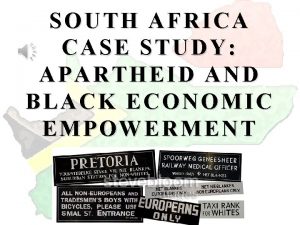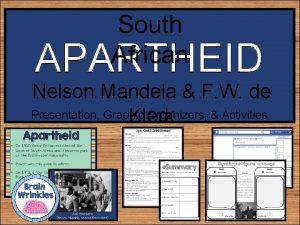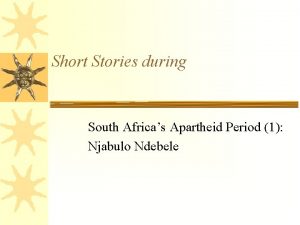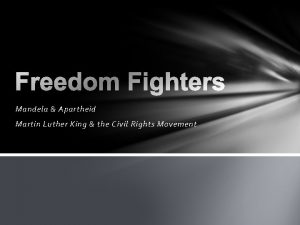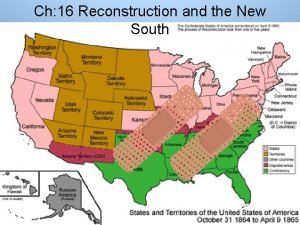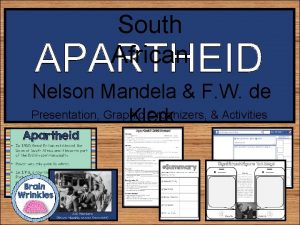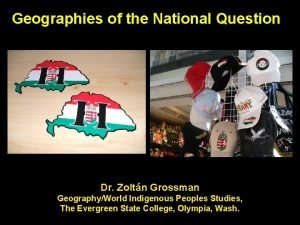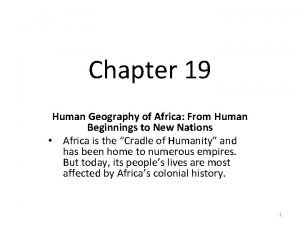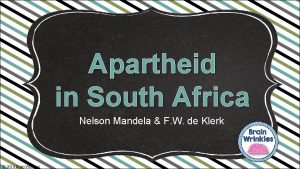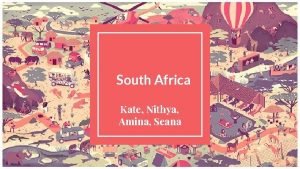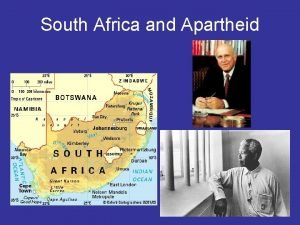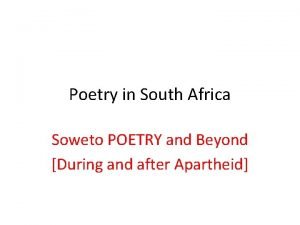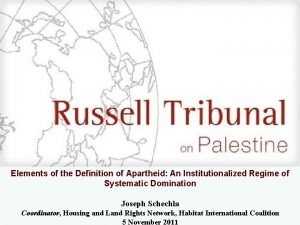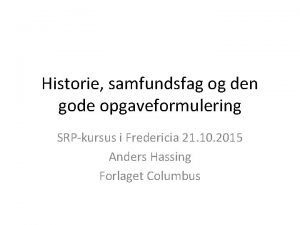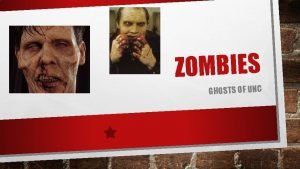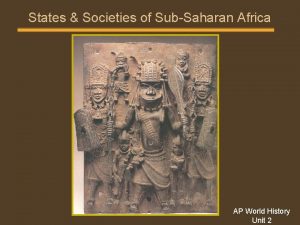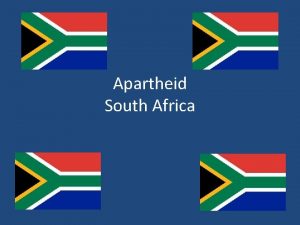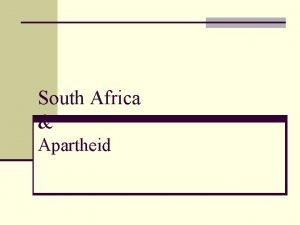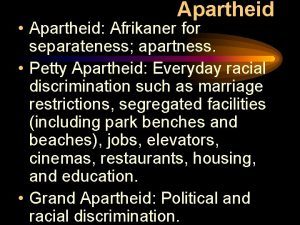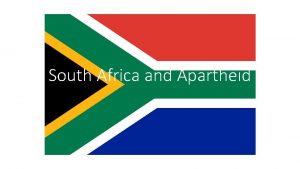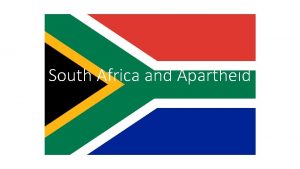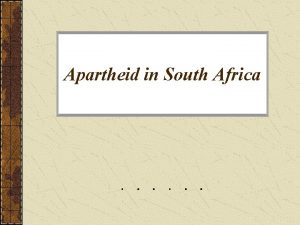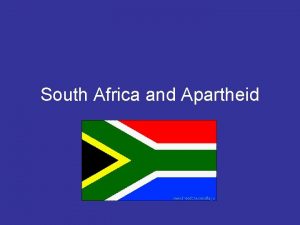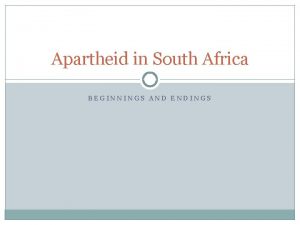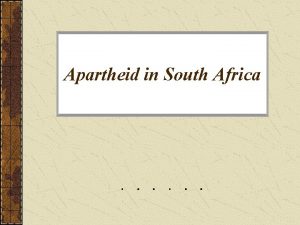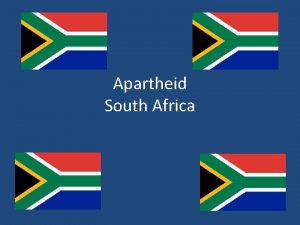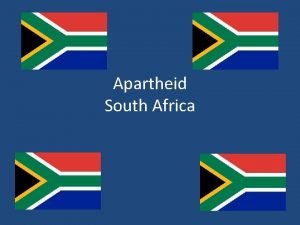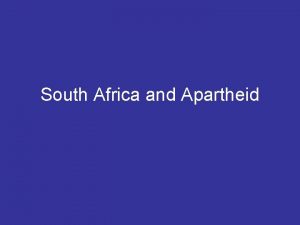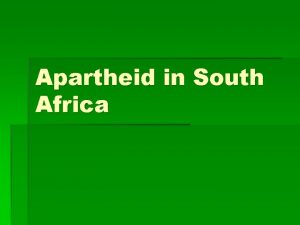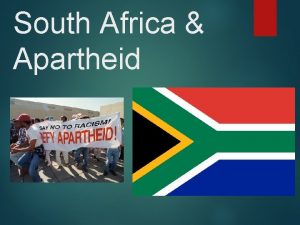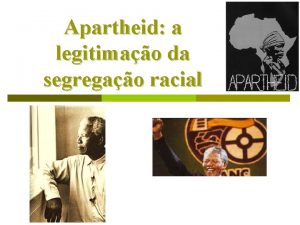The History of Apartheid in S Africa Apartheid






































- Slides: 38

The History of Apartheid in S. Africa Apartheid: Apartness

Apartheid = “Separateness” The separation of races

Objectives • Explain what apartheid was • Explain why Europeans wanted S. Africa in the first place • Identify what apartheid was like • Identify how apartheid ended

Early History A Time Line • • 1806 – British seize Cape of Good Hope 1867 – Discovery of Gold 1886 – Discovery of Diamonds 1889 – 1902 – The Boer War (British and Dutch settlers) • 1902 – The beginning of apartheid • 1990’s – The end of apartheid

South Africa • Twice the size of Texas

Why? • Europeans wanted S. African resources • Especially diamonds

Apartheid • Laws enacted in 1948, racial discrimination becomes institutionalized • Race laws touch every aspect of social life • “White only” laws-blacks had to carry passbooks

Apartheid- racial segregation and Citizenship • The system of legal racial segregation was enforced by the National Party government in SA between 1948 and 1994 (46 yrs). • The National Party legislation classified inhabitants into racial groups (‘black’, ‘white’, ‘coloured’ and ‘Indian’ • In 1958 Blacks were deprived of their citizenship, legally becoming citizens of one of the ten tribally based selfgoverning homelands called bantustans. Needed a “passbook” when leaving one of the bantustans.

Homelands • “Reservations” or “Bantustans” • Established 9 African groups • Each was to become a nation within its own homeland • Africans had rights and freedoms • Outside the homelands, treated as aliens • Poor quality land with erosion • Completely incapable of supporting large populations

“Jo’Burg” Today Johannesburg Suburb of Jo’Burg

Homelands • Semiindependent areas occupied by blacks

The Pass Book • Needed special permits to live outside of reservations, but not with family • Lived in Townships (the city’s perimeter) • Curfew regulations • Passbook raids • Failure to meet curfew or have passbook = subject to arrest




Apartheid-Public facilities and jobs medical care and other public services and provided black people with service inferior to those of Whites üPractical separation of residential areas üSeparation of public institutions e. g. schools and hospitals. üSeparation of jobs, ”jobs for whites only” üSeparate use of facilities like toilets, chairs, bus stops, stair-cases etc. üBlack buses stopped at black bus stops and white buses at white ones. Trains, hospitals and ambulances were segregated

Various laws applied in the use of public facilities, like chairs, toilets, bus stops, stair-cases etc.

Warnings



Apartheid separated the whites from the non-whites

• • • Apartheid No Rights for Non-whites No right to vote No ownership of land No right to move freely No right to free speech No right to protest the government

Apartheid- Marriages and business • Prohibition of Mixed Marriages Act 55 of 1949, prohibiting marriages between white people and people of other races • Blacks were not allowed to run a business in the areas that were meant for white South Africans.

Apartheid- Rights of women • Colonialism and apartheid had an impact on women since they suffered both racial and gender discrimination. • Women had few or no legal rights. No right to own property.

Apartheid Education Bantu Education Act (1953) gave the central government control over African education "Native education should be controlled. . . in accord with the policy of the state. . . If the native in South Africa today in any kind of school in existence is being taught to expect that he will live his adult life under a policy of equal rights, he is making a big mistake. . . There is no place for him in the European community above the level of certain forms of labor. " -Hendrik Verwoerd, Prime Minister

Sharpsville Massacre • March 21 • *On this date in 1960, police in Sharpeville, near Johannesburg, fired on Black South Africans protesting racially biased pass laws. The protesters suffered 72 deaths and more than 200 injuries in two days of violence

Sharpville Massacres

Student Uprising: 1976 Black students were forced to learn in Afrikaans. Protests against Afrikaans started. More than 500 black students killed by white policemen. More than a thousand men, women and children wounded.


Nelson Mandela • Arrested in 1962 for opposing the apartheid laws • The African National Congress was a banned organization, he was a part of it • In jail until 1990 • Elected first black president in 1994

Nelson Mandela § Nelson Mandela peacefully fought to end apartheid. He served 27 years in prison for such “treason. ” § Thousands of other South African nonwhites were imprisoned and executed for their resistance against apartheid.


Desmond Tutu • Another leader against apartheid • Religious leader

Tutu Quotations • "When missionaries came to South Africa, we had the land, they had the Bible. Then they told us, 'Let's close our eyes and pray. ' When we opened our eyes we saw that we have the Bible, they have the land. " • "If you are neutral in situations of injustice, you have chosen the side of the oppressor. If an elephant has its foot on the tail of a mouse and you say that you are neutral, the mouse will not appreciate your neutrality. "

1985 Demonstration • In 1985 an International Day for the Elimination of Racial Discrimination was organized. The demonstration was held at Langa Township in Uitenhage. The day commemorates the anniversary of the March 21, 1960 massacre.

1994 • Reservations abolished and territories reabsorbed into the nation of South Africa • Apartheid caused major economic hardships on South Africa • International sanctions • Decreased labor force • Cut investments from countries like U. S. A. • First multiracial election • Nelson Mandela elected president of South Africa (1994 – 1999)


To close… • Explain what apartheid was • Explain why Europeans wanted S. Africa in the first place • Identify what apartheid was like • Identify how apartheid ended
 How was apartheid practiced in south africa
How was apartheid practiced in south africa South africa flag name
South africa flag name Apartheid cloze notes
Apartheid cloze notes What was apartheid
What was apartheid Short stories about apartheid
Short stories about apartheid Apartheid
Apartheid Martin luther king apartheid
Martin luther king apartheid Apartheid vs jim crow venn diagram
Apartheid vs jim crow venn diagram Apartheid comprehension check answer key
Apartheid comprehension check answer key The south african apartheid
The south african apartheid Apartheid
Apartheid Human geography of africa
Human geography of africa Apartheid
Apartheid 1994 apartheid
1994 apartheid Apartheid definition
Apartheid definition Apartheid
Apartheid Always a suspect poem analysis pdf
Always a suspect poem analysis pdf Which statement best defines a communist government?
Which statement best defines a communist government? Definition
Definition Srp hooliganisme
Srp hooliganisme What is the history of community development in tanzania?
What is the history of community development in tanzania? History of zombies in africa
History of zombies in africa Ap world history chapter 25 africa and the atlantic world
Ap world history chapter 25 africa and the atlantic world Sub saharan africa ap world history
Sub saharan africa ap world history Hình ảnh bộ gõ cơ thể búng tay
Hình ảnh bộ gõ cơ thể búng tay Ng-html
Ng-html Bổ thể
Bổ thể Tỉ lệ cơ thể trẻ em
Tỉ lệ cơ thể trẻ em Gấu đi như thế nào
Gấu đi như thế nào Glasgow thang điểm
Glasgow thang điểm Chúa yêu trần thế
Chúa yêu trần thế Các môn thể thao bắt đầu bằng tiếng đua
Các môn thể thao bắt đầu bằng tiếng đua Thế nào là hệ số cao nhất
Thế nào là hệ số cao nhất Các châu lục và đại dương trên thế giới
Các châu lục và đại dương trên thế giới Công thức tiính động năng
Công thức tiính động năng Trời xanh đây là của chúng ta thể thơ
Trời xanh đây là của chúng ta thể thơ Mật thư tọa độ 5x5
Mật thư tọa độ 5x5 101012 bằng
101012 bằng Phản ứng thế ankan
Phản ứng thế ankan
